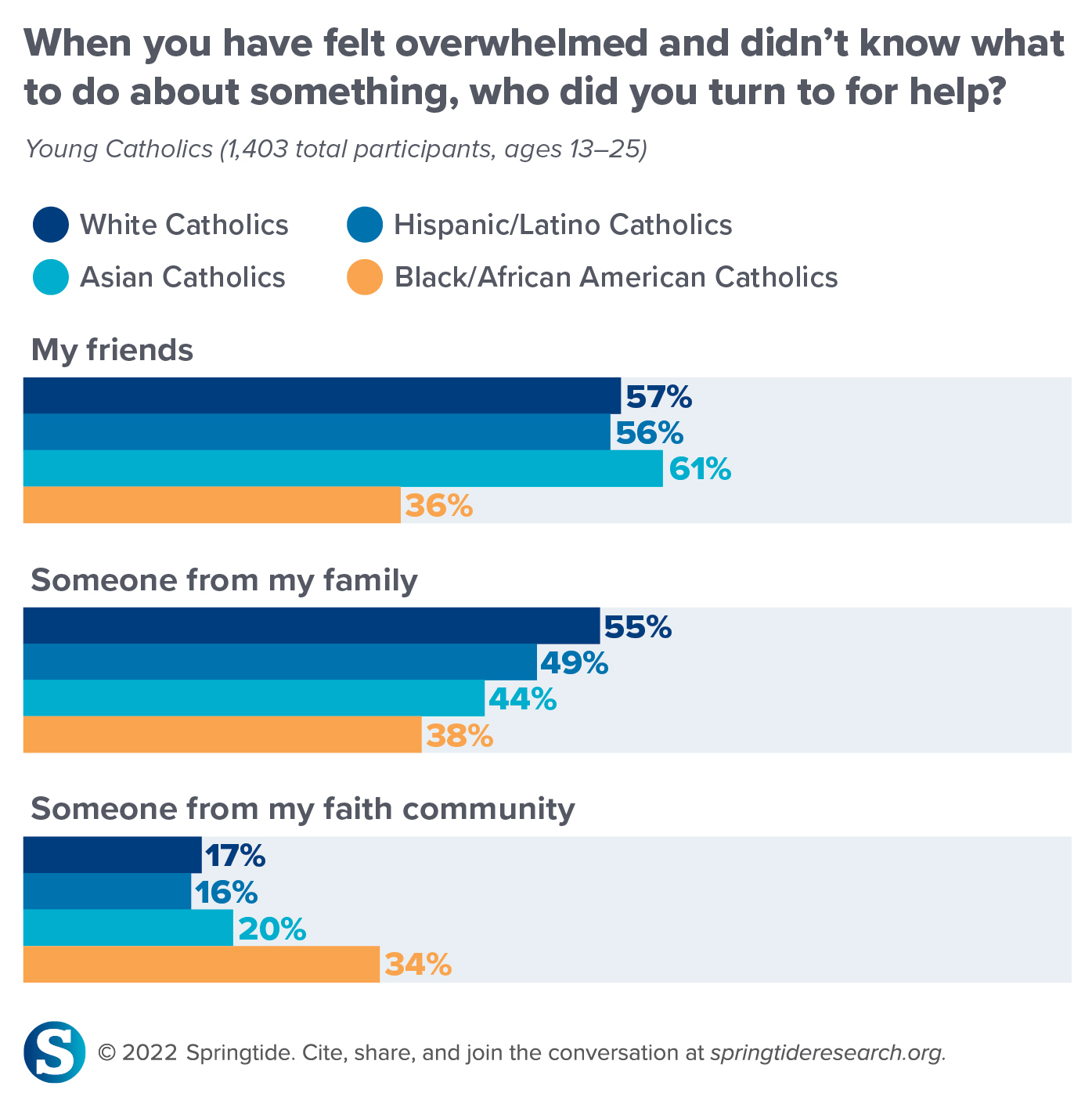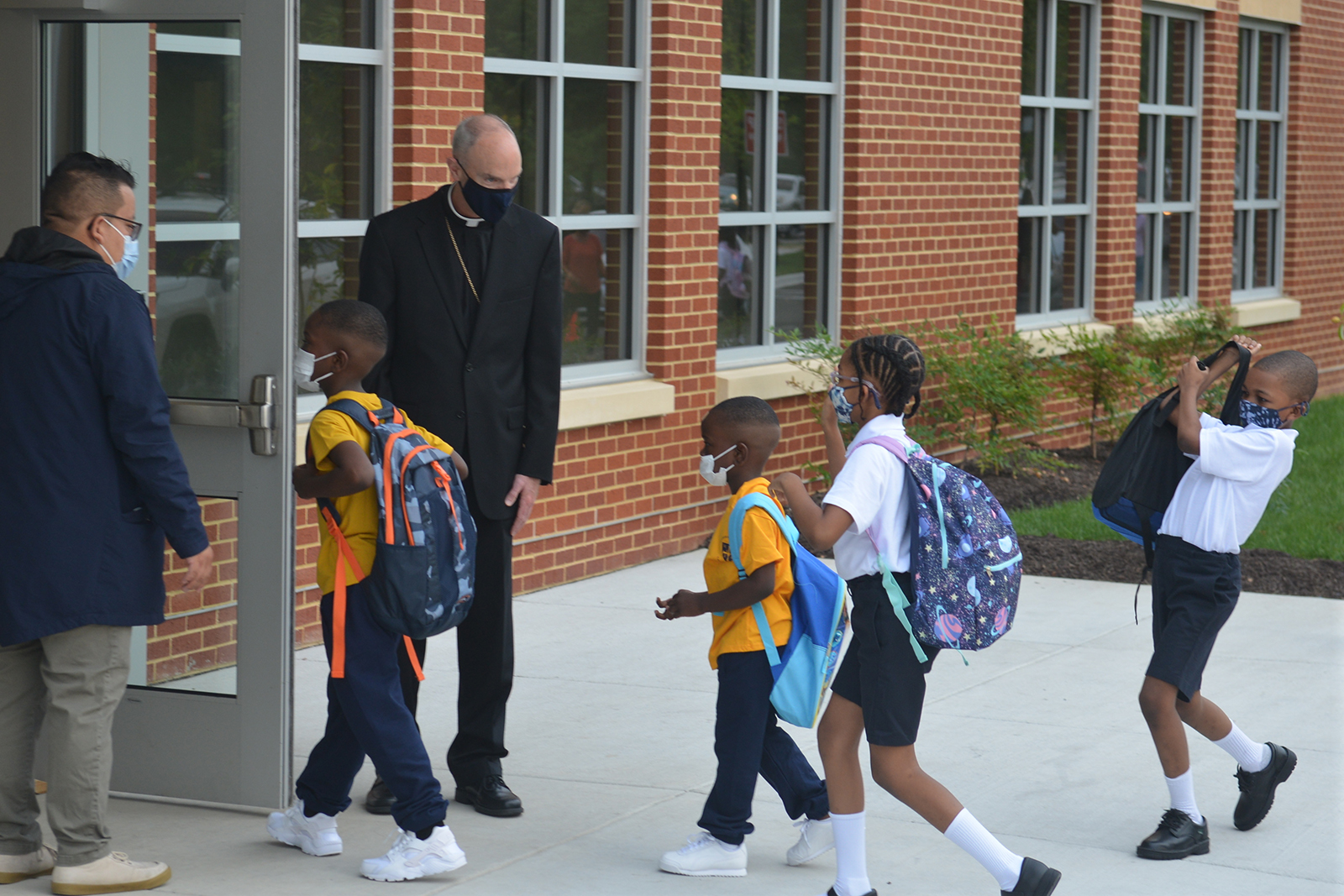
(RNS) — Kizito Katende is used to getting surprised looks. “Some people are taken aback a little bit, because they really wouldn’t expect a young Black person to be Catholic,” he said.
Kizito is 18 years old and attends a predominantly white parish in Detroit. For the most part, his experiences in the Catholic Church have been positive. “When done well, Catholicism is very welcoming, like a family, and it’s not discriminatory. For the most part, I have been treated well by other Catholics. Catholicism welcomes Black people,” he explained.
Though recent studies have pointed out that young Black Catholics are attending religious services less than older generations, new data from Springtide Research Institute presents a different perspective: When compared to young Catholics of other racial groups, Springtide findings suggest young Black Catholics have a more promising future in the faith than their peers — though difficult experiences in predominantly white spaces present challenges.
Religious and flourishing
In a new study looking at the spirituality of young Catholics ages 13-25, Springtide Research Institute found that 39% of young Black Catholics say they’re “flourishing a lot” in their faith lives, compared to just 21% of young white Catholics. In fact, young Black Catholics say they’re flourishing in every area of their lives (e.g. mental health, friendships, home, finances) more than their Catholic peers of other racial groups.
The study also found young Black Catholics are more traditionally religious than their Catholic peers of other racial groups. They’re more likely to trust organized religion, attend religious services and youth groups, pray daily and study Scripture, consider themselves to be a religious or spiritual person, and carry their spiritual beliefs into their daily lives.
Furthermore, young Black Catholics are far more likely than young white or Hispanic Catholics to seek help from their faith community when they are overwhelmed and don’t know what to do about something — and less likely to turn to friends or family.

“When you have felt overwhelmed and didn’t know what to do about something, who did you turn to for help?” Graphic courtesy of Springtide
Byron Wratee: Black Catholic faith is intergenerational and progressive
Why are young Black Catholics more engaged in Catholic life than their peers? Through my experiences engaging with this subset, I have learned that Black Catholic faith is still an intergenerational phenomenon. Grandparents, parents, aunties and uncles are encouraging younger Black Catholics to attend church. While the numbers of churchgoing Black Catholic millennials and Gen Zers is decreasing, they have maintained a higher connection to church because their family stresses the importance.
Amethyst Rose, a 24-year-old professional dancer in Chicago, told Springtide that many Black Gen Zers have strong connections to highly religious family members. Even if their parents (typically Gen Xers or older millennials) do not attend church regularly, their baby boomer or silent generation grandparents will take them to church. By comparison, many of the predominantly white students I teach can count the number of times they have been to church in their life on one hand.
Why are young Black Catholics turning to faith communities over loved ones during challenging times? When it comes to their elders, I believe older Black Americans often see questioning or doubting as dangerous, community-destroying and life-threatening activities.
Faith in God and the Black Church has literally sustained Black communities during chattel slavery, American apartheid and contemporary anti-Black violence. For many Black elders, our lives depend on such faith in God and the Black Church. Black congregations literally sing gospel songs about God paying the rent, healing cancer, winning court cases and fighting our battles.
Pew found that even religiously unaffiliated Black Americans believe that God will directly intervene in the world for them. Very few Black Americans identify as atheist, and religiously unaffiliated Black Americans engage in religious devotions at a high rate. I personally know a lot of Black people who don’t go to church, but I don’t know many Black atheists. No one would tell their Black grandmother they don’t believe in God or dislike the Church.

Youngsters enter the first new Catholic school built in Baltimore in roughly 60 years with a mix of enthusiasm and first-day jitters, Aug. 30, 2021. The 65,000-square-foot school near downtown Baltimore is an anomaly in the national education landscape, where the pandemic has shuttered many parish schools. It’s named after Mother Mary Lange, who started a Catholic school for Black children in 1828. (AP Photo/David McFadden)
Black Catholic churches probably align more with Gen Z’s values than those of their parents and grandparents, which may also explain why they turn to faith communities over family members. While older Black churchgoers may silently disapprove of LGBT sexual ethics, most predominantly Black Catholic parishes are socially progressive.
I have never heard an anti-LGBT sermon in a Black Catholic church or attended a predominately Black Catholic church where LGBT families were not welcomed. The leading Black Catholic ethicist, Fr. Bryan Massingale, is openly gay, and he is highly respected in the Black Catholic community. Nevertheless, African-born Black Catholics tend to be more socially conservative than U.S.-born Black Catholics. Again, they may express a different sexual ethic at home but remain silent about it at church. All in all, the church remains the safest place for young Black Catholics to talk about their sexual identities.
Struggles in predominantly white spaces
Many young Black Catholics, however, don’t have access to predominantly Black Catholic communities. Asiimwe Najjuma, who is 23 years old and Kizito’s sister, fears that for many young Black Catholics, unacknowledged racial trauma in predominantly white Catholic spaces could be the reason they walk away from the faith before or during adulthood.
“I stand by my church and I’m happy to have a Catholic parish” she said, but after the murder of George Floyd in 2020, “I remember waiting to see how my (predominantly white) church would respond to that … and it just wasn’t discussed.” She added, “That was the first time I really felt like, OK, maybe my demographic isn’t really being acknowledged in this space. Since then, and seeing how my white Catholic peers also responded to the issue and not being satisfied with how seriously white Catholics were taking it, that’s when I started to not feel seen.”
Not having peers who can relate makes these experiences all the more isolating. Asiimwe went to a Catholic high school where there was only a small handful of Black people. She attended predominantly Catholic summer camps where she was one of a few Black people there. “I don’t really know any Black Catholics,” Asiimwe said, adding, “There was one Black Catholic priest at my parish who’s no longer there. My family had him over for dinner once or twice and he was cool, but he’s not around anymore.”
Seeing young Black Catholics
Without peers who can relate to her at church, Asiimwe turns to her sister, Adora Namigadde, who is 29 years old and works as a Metro Reporter at WBEZ-FM 91.5 in Chicago.
“In my experience, Catholicism is viewed as a white religion in America. In order to better engage young Black Catholics, I think priests and parishes need to be willing to humbly ask them what issues are important to them and be willing to talk about them,” Adora said.
She added, “My deepest pain has been feeling alone or like the majority of people who believe the same things I do don’t relate to me on some fundamental level. We can’t change the demographics of the Church overnight, but actively extending a hand, being willing to listen and inviting Black Catholics into deeper participation would bear great fruit.”
The stakes are real. Pew Research found that just 54% of Black adults raised as Catholics continue to identify as such, compared with 61% of white adults and 68% of Hispanic adults.
It appears that Catholic leaders see the urgency. In February 2021, as part of a series of listening sessions entitled “Journeying Together,” the United States Conference of Catholic Bishops (USCCB) asked young Black Catholics “what it means to be a Black Catholic today — i.e., concerns, challenges, and hopes for the future.” It was part of USCCB’s effort to “foster understanding and trust within and across cultural families toward a more welcoming and just community of faith.” A recording of the dialogue is here.
The National Black Catholic Congress (NBCC), which meets every five years, is also making an intentional effort to attract young people to the conference this year. “The Congress is looking for young adults of all backgrounds … interested in bolstering our mission to serve young adults in the church,” NBCC rep LaRyssa Herrington tweeted.
Traditional markers for determining one’s religiosity — like how often they attend religious services — tend to result in overgeneralizations about Gen Z’s curiosity about religion and spirituality. Mainly, these markers promote a “decline narrative” that religion in this generation is limping along at best, and perhaps dying out at worst. However, there could just as well be an exciting future for young Black Catholics in America, a group that is growing, flourishing and rooted in traditional religious practices more than their peers.
(Josh Packard (@drjoshpackard) is executive director of Springtide Research Institute. Byron Wratee is a doctoral candidate in systematic theology at Boston College and a recurring panelist on Black Catholics and the Millennial Gap. The views expressed in this commentary do not necessarily reflect those of Religion News Service.)
